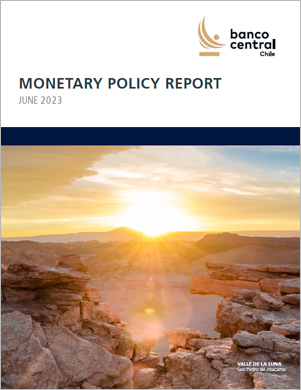Monetary Policy Report June 2023
Monetary Policy Report June 2023

The economy has been advancing in the resolution of the macroeconomic imbalances accumulated in recent years. This has helped to reduce inflation in line with expectations, making progress in consolidating its convergence to the 3% target. In general, domestic activity and demand have evolved as expected, although with a steeper-than-expected decline in the durable component of private consumption. The central scenario projections show limited changes in magnitude. For this year, activity is expected to grow between -0.5% and 0.25%. In 2024 it will grow between 1.25 and 2.25% and between 2% and 3% in 2025. World activity began the year with greater dynamism and financial volatility has been reduced. Nevertheless, a scenario of tight financial conditions continues to be projected, in an environment where uncertainty remains high and a more contractionary monetary policy is expected in the main economies in the face of the challenge of curbing their inflation rates. The monetary policy rate (MPR) has been kept contractionary for several quarters, which has contributed significantly to bring down inflation. While inflationary risks persist, they have been balancing out. The Board believes that the most recent evolution of the economy points in the required direction. If these trends continue, the MPR will start a downward process in the short term. The magnitude and timing of its reduction will consider the evolution of the macroeconomic scenario and its implications for the inflation trajectory. The Board reaffirms its commitment to act with flexibility in case any of the identified internal or external risks comes true and macroeconomic conditions so advise.
What does this MP Report tell us?

Inflation is still very high, although it has been declining and will reach the 3% target next year. The monetary policy implemented by the Central Bank has played an important role in it.

Our economy has been making progress in its necessary adjustment process after being confronted with major imbalances.

Inflation is still very high, although it has been declining and will reach the 3% target next year. The monetary policy implemented by the Central Bank has played an important role in it.
- In recent months, inflation has been decreasing from levels above 12% annually to 8.7% last May.
- This has occurred as the economy has been resolving its imbalances, in which the Central Bank’s monetary policy has played a key role.
- The decrease in inflation has been driven by prices that usually vary more easily (volatile). Recently, there has also been a drop in the prices of goods. Services inflation has been stable.
- Lower cost pressures, the decline in the dollar and the adjustment in consumption also contributed.
- Headline inflation will converge to the 3% target in 2024 and will remain in the neighborhood from then onwards.

Our economy has been making progress in its necessary adjustment process after being confronted with major imbalances.
- In general, the economy has evolved in line with expectations. The main differences with respect to previous projections are in mining activity and the consumption of imported goods.
- Consumption behavior is adjusting in line with the labor and financial situation of individuals.
- During the year, formal wage jobs have fallen compared to increases in self-employment and informal salaried jobs.
- Meanwhile, the financial burden of households has grown heavier because of higher inflation and the resulting rise in credit-related interest rates.

This year the Chilean economy will grow slightly less than estimated in March, while 2024 will be slightly better. Inflation will end this year at 4.2%.
- Growth projections see minor changes with respect to the previous Report, mainly associated with the performance of the mining industry.
- This year, the economy will grow between -0.5 and 0.25%. For 2024 and 2025, variations are expected between 1.25-2.25% and 2.0-3.0%, respectively.
- Inflation is expected to continue to fall, ending the year at 4.2%.
- Our projections consider a decrease in uncertainty and in its impact on the strengthening of the Chilean peso and the consolidation of the economy’s adjustment process, among other elements.

Our economy continues to be exposed to important risks and the Central Bank will continue to monitor their evolution to act promptly.
- The risks are significant and originate primarily in global financial conditions.
- A further deterioration of external conditions could trigger episodes of high volatility and reduce liquidity, among other adverse effects.
- This would complicate the Chilean economy, affecting growth and inflation.
- The Board of the Central Bank will keep a watchful eye on the changes that may occur and act promptly in favor of the people.
